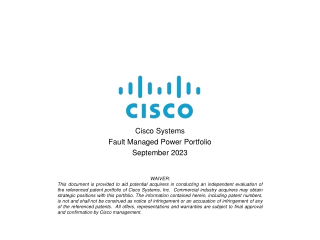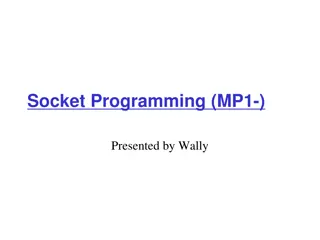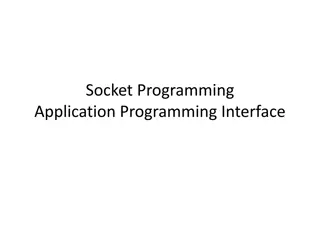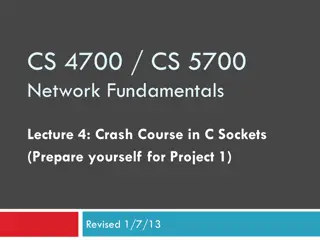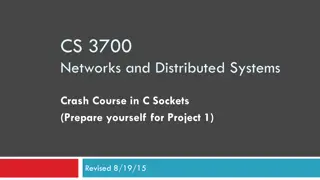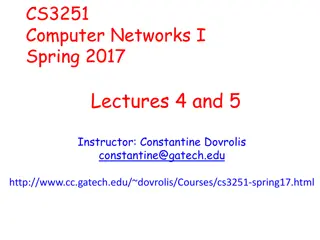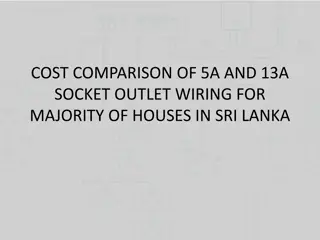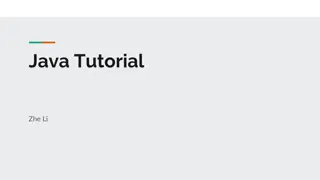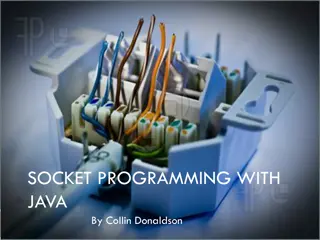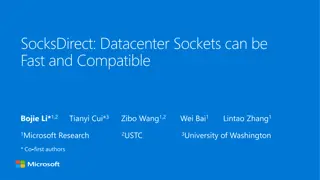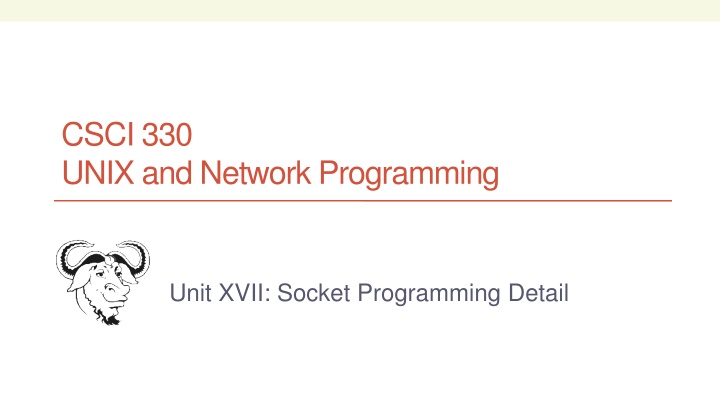
Socket Programming Detail in CSCI 330 - Unix and Network Programming
Explore the intricacies of socket programming in CSCI 330 - Unix and Network Programming, including TCP programming, socket behaviors like blocking vs. non-blocking, and important socket system calls for creating communication endpoints, binding addresses, and managing connections.
Download Presentation

Please find below an Image/Link to download the presentation.
The content on the website is provided AS IS for your information and personal use only. It may not be sold, licensed, or shared on other websites without obtaining consent from the author. If you encounter any issues during the download, it is possible that the publisher has removed the file from their server.
You are allowed to download the files provided on this website for personal or commercial use, subject to the condition that they are used lawfully. All files are the property of their respective owners.
The content on the website is provided AS IS for your information and personal use only. It may not be sold, licensed, or shared on other websites without obtaining consent from the author.
E N D
Presentation Transcript
CSCI 330 UNIX and Network Programming Unit XVII: Socket Programming Detail
CSCI 330 - UNIX and Network Programming 2 Unit Overview TCP programming socket behavior blocking vs. non-blocking signal handler
CSCI 330 - UNIX and Network Programming 3 Socket system calls client server Primitive Meaning socket Create a new communication endpoint bind Attach a local address to a socket listen Announce willingness to accept connections accept Block caller until a connection request arrives connect Actively attempt to establish a connection write Send(write) some data over the connection read Receive(read) some data over the connection close Release the connection
CSCI 330 - UNIX and Network Programming 4 TCP socket programming sockets can operate in one of two modes: blocking or non-blocking default: blocking mode calls may block, i.e. wait for something before they return blocking is a special state in which a process is waiting for I/O process is removed from the scheduler queue when the I/O completes, the process is woken up non-blocking mode calls returns immediately, producing full, partial or no result
CSCI 330 - UNIX and Network Programming 5 Blocking mode: calls that can block accept blocks until a connection is present connect blocks until connection is established read blocks if no data is available write blocks when data does not fit into send buffer of the socket
CSCI 330 - UNIX and Network Programming 6 Illustration: blocking mode // loop to write a single character char c = 'x'; while (true) { if (write(sock, &c, 1) < 1) { perror("write"); exit(EXIT_FAILURE); } }
CSCI 330 - UNIX and Network Programming 7 Illustration: dummy server
CSCI 330 - UNIX and Network Programming 8 Illustration: blocking mode
CSCI 330 - UNIX and Network Programming 9 What to do when call blocks ? Answer: wait or: set alarm i.e. schedule signal to sent in future how: set alarm timeout program and install signal handler
CSCI 330 - UNIX and Network Programming 10 System call: alarm
CSCI 330 - UNIX and Network Programming 11 System call: alarm unsigned int alarm(unsigned int seconds) arranges for a SIGALRM signal to be delivered to the calling process in seconds seconds any previously set alarm is canceled if seconds is zero, no new alarm is scheduled returns the number of seconds remaining until any previously scheduled alarm was due to be delivered returns zero if there was no previously scheduled alarm
CSCI 330 - UNIX and Network Programming 12 Illustration: blocking mode
CSCI 330 - UNIX and Network Programming 13 System call: signal
CSCI 330 - UNIX and Network Programming 14 System call: signal typedef void (*sighandler_t)(int); sighandler_t signal(int signum, sighandler_t handler) sets the disposition of the signal signum to handler handler can be: SIG_IGNto ignore signal SIG_DFLto restore default address of a programmer-defined function returns the previous value of the signal handler
CSCI 330 - UNIX and Network Programming 15 Signal handler: detail void alarm_action(int s) { cerr << "write blocked after " << count << " characters\n"; exit(EXIT_SUCCESS); } // set signal handler on ALARM signal(SIGALRM, alarm_action);
CSCI 330 - UNIX and Network Programming 16 Illustration: blocking mode w/signal
CSCI 330 - UNIX and Network Programming 17 TCP socket: non-blocking mode calls returns immediately, producing full, partial or no result socket can be in blocking or non-blocking mode determined by flag associated with socket descriptor flag can be set via fcntl system call
CSCI 330 - UNIX and Network Programming 18 Non-Blocking mode: call behavior accept when there are connections to accept, accept behaves as usual if there are no pending connections, returns 1 with errno set to EWOULDBLOCK connect when connection to a listening server can be established, connect behaves as usual if connection cannot be established, connect returns 1 with errno set to EINPROGRESS
CSCI 330 - UNIX and Network Programming 19 Non-Blocking mode: call behavior read when there is data to read, read behaves as usual if there is no data, read returns 1 with errno EWOULDBLOCK write when buffer space is available, write behaves as usual if buffer becomes full, write returns number of bytes written if buffer is full, write returns -1 with errno EWOULDBLOCK
CSCI 330 - UNIX and Network Programming 20 System call: fcntl
CSCI 330 - UNIX and Network Programming 21 System call: fcntl int fcntl(int fd, int cmd, ... /* arg */ ) performs operation cmd on the open descriptor fd cmd to set non-blocking mode for socket: F_SETFL, O_NONBLOCK returns -1 on error
CSCI 330 - UNIX and Network Programming 22 Illustration: non-blocking write
CSCI 330 - UNIX and Network Programming 23 Summary TCP programming socket behavior blocking vs. non-blocking signal handler

